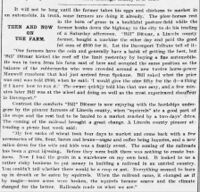1907-06-30-tacoma-daily-ledger-p30-bill-ditmar-car-and-squirels
June 30, 1907 Tacoma Daily Ledger Page 30:
THEN AND NOW ON THE FARM.
It will not be long until the farmer takes his eggs and chickens to market in an automobile. In truth, some farmers are doing it already. The plow-horses rest in the barn or graze in a healthful pasture-field while the farmer honks down the highway to the city to do his trading of a Saturday afternoon. “Bill” Ditmar, a Lincoln county farmer, bought a machine the other day and paid the good fat sum of $950 for it. Let the Davenport Tribune tell of it:
“Our farmers have the coin and generally have a habit of getting the best, but ‘Bil?’ Ditmar kicked the roof off the limit yesterday by buying a fine automobile. He was in town from his farm east of here and occupied the same position as the balance of the rubbernecks who were crowded around a new twelve horse-power Maxwell runabout that had just arrived from Spokane. Bill asked what the price was and was told $950, when he said: ‘I would give the nine fifty for the d—n thing if I knew how to run it.’ The owner quickly told him that was easy, and a few minutes later Bill was at the wheel and doing as well as the most experienced chauffeur in Davenport.”
Contrast the comforts “Bill” Ditmar is now enjoying with the hardships undergone by the pioneer farmers of Lincoln county, when “squirrels” ate a good part of the crops and the rest had to be hauled to a market reached by a two-days’ drive. The coming of the railroad brought a great change. A Lincoln county pioneer at- tending a picnic last week said:
“My few sacks of wheat took four days to market and come back with a few necessaries of life, flour, bacon and beans—sugar and coffee being luxuries, and a new calico dress for the wife and kids was a family event. The coming of the railroads has been a great blessing. Before they were built there was nothing to create business. Now I load the grain in a warehouse on my own land. It looked to us a rather risky business to put money in building a railroad in an untried country. You couldn’t tell whether there would be a crop or not. Everything seemed to burn up in drought or be eaten by squirrels. When the railroad came, it changed as if by magic—more acres were broken, the squirrels became scarce and the climate changed for the better. Railroads made us what we are.”
